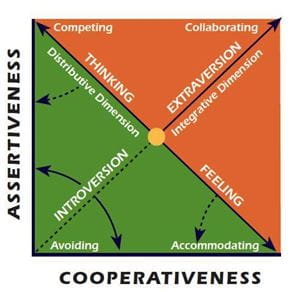Correlating the MBTI and TKI assessments
Ralph Kilmann

The first draft of the Thomas-Kilmann Conflict Mode Instrument (TKI) was created in early 1971 at the University of California, Los Angeles. In UCLA’s Graduate School of Management, Ken Thomas was a young assistant professor, and I was an even younger doctoral student. After several more rounds of data collection – which allowed us to fine-tune the instructions, the 30 items, and the accompanying interpretive materials – the TKI instrument was ready for publication.
For the next four decades, I continued using it in my research, teaching, and consulting projects, which allowed me to learn more and more about conflict management. Last year, on the 40th anniversary of the birth of the TKI instrument, I compiled my favourite insights from using this deceptively simple assessment tool.
This blog is the first in a series of favourite insights that I’ll be sharing with you on Personality Matters over the coming weeks.
The TKI assessment measures the relative frequency with which you use five modes of behaviour – competing, collaborating, compromising, avoiding, and accommodating – in a conflict situation. After taking the assessment, you become aware that you’ve been using, out of habit, one or more modes too much and one or more modes too little. By learning how to purposely choose the right mode for a given situation – no longer constrained by unconsciously overusing or under-using a conflict mode – more of your needs, and other people’s needs, can be met.
Many years ago (1975) I published a research study with Ken Thomas, wherein we correlated the Myers-Briggs Type Indicator (MBTI) assessment with the TKI assessment. We wanted to see whether certain enduring personality traits would predispose people to use certain conflict-handling modes more than others.
We found that people who prefer Extraversion are more likely to use collaborating, while people who prefer Introversion are more inclined to use avoiding (as a statistically significant correlation, not as a one-to-one relationship). It seems that collaborating requires a little extra energy in interacting with others (sharing ideas and discussing concerns), while avoiding naturally involves an element of shyness or aloofness in an interpersonal situation.
In addition, we found that the Thinking preference is related to competing, while the Feeling function is related to accommodating (again, as a statistically significant correlation). Perhaps the Thinking preference allows a person to keep an emotional distance from the other person - to pursue her own needs at the expense of the other person’s. Meanwhile, the Feeling person’s empathy for the other person might compel him to satisfy the other’s needs more than his own.
For decades, I’ve been making use of both assessment tools in training and consulting projects so that people can become more aware of their proclivities for using certain conflict modes too much and others too little – based on their psychological type. With that awareness, people can then consciously compensate with their conflict-handling behaviour. For example, an Introvert can knowingly put out some extra effort in order to engage another person in a collaborative discussion (when the necessary conditions for collaborating are evident). Similarly, a person who prefers Feeling can knowingly assert his needs, when competing is called for, when her natural tendency would automatically be to accommodate the other person’s needs.
If you’re interested in finding out more about the correlations between the MBTI and the TKI assessments, you can find the original article at http://www.kilmanndiagnostics.com/interpersonal.html.
Ralph H. Kilmann, PhD, is CEO and Senior Consultant at Kilmann Diagnostics in Newport Coast, California. Formerly, he was the George H. Love Professor of Organization and Management at the Katz School of Business, University of Pittsburgh – which was his professional home for 30 years. He earned both his BS degree and MS degree in industrial administration from Carnegie Mellon University (1970) and a PhD degree in management from the University of California, Los Angeles (1972). Kilmann is co-author of the TKI assessment and has published more than twenty books and one hundred articles on conflict management, problem management, organizational design, change management, and quantum organizations.